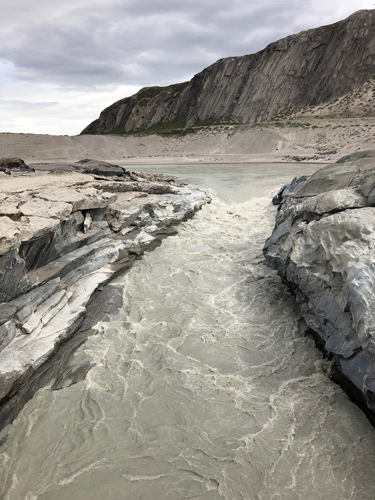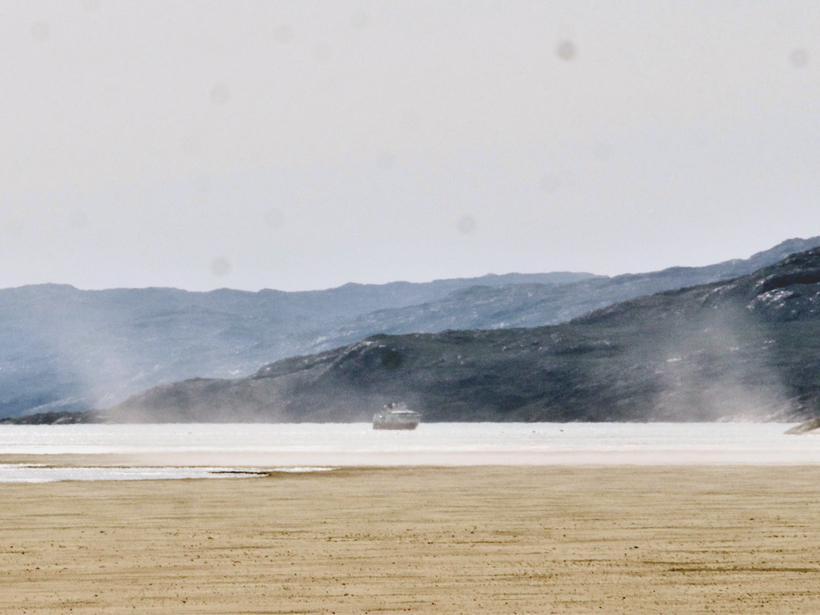As the High North swelters through a record-breaking summer, with temperatures in parts of Greenland spiking up to 22°C above normal this June, new research suggests that ecosystems in this most rapidly warming part of the world are far more sensitive to sudden climate shifts than expected. Two recent abrupt temperature hikes in West Greenland triggered precipitous ongoing changes, including increased ice sheet melt, intense dust storms, and earlier spring plant growth and lake thaw, according to a new study recently published in Environmental Research Letters.
The researchers were surprised by how quickly ecosystems stretching from the Greenland Ice Sheet to the lake-potholed tundra near the southwest coast responded when average June air temperatures took a sudden turn upward beginning in 1994, signaling a climate shift during the spring thaw. Plants almost simultaneously started leafing out on average 10 days earlier in spring, and lake ice thaw moved up nearly a week, while ice sheet runoff accelerated relatively soon after. Further nonlinear responses were seen after July temperatures jumped in 2006, the onset of a summer climate shift.
“We’re seeing environmental responses much more quickly than we might have expected.”
These reactions were much more rapid and extensive than prior research based on paleoecological records of significantly larger temperature changes had suggested, indicating the Arctic is less resilient to today’s warming than previously believed.
“We’re seeing environmental responses much more quickly than we might have expected,” says lead author Jasmine Saros, a lake ecologist and associate director of the University of Maine Climate Change Institute. “What it means is that the system is very sensitive to climate. It responds quickly when the temperatures go up.”
The report, a collaboration between 20 international researchers in a variety of geoscience disciplines, began as kitchen conversations at a research facility in Kangerlussuaq, where many scientists working in western Greenland stay. All wanted to see what was happening across the landscape as the region heated up.
Identifying Abrupt Climate Shifts

The team analyzed regional weather records from the 1970s to 2015, along with time series data from long-term monitoring of the Greenland Ice Sheet and land and lake systems. They found two abrupt climate shifts: a 2.2°C rise in average June temperatures accompanied by a doubling in winter precipitation that began in 1994 and a 1.1°C July temperature jump starting in 2006. Both changes corresponded to a sudden strengthening of the atmospheric high-pressure system known as the Greenland Blocking Index.
Following the June shift, ice sheet runoff volume increased 54% by 2002, and the number of severe dust storms nearly quadrupled. And after the July temperature hike, spring plant growth moved forward another 13 days, lakes quickly warmed, and deepwater algae began to thrive.
The findings challenge the widely held notion that internal ecosystem dynamics delay the impacts of abrupt external changes.
“Prior work has suggested that there are often lags in environmental response,” says Saros. “But not in our study.”
Arctic systems, because of their shorter growing season and simpler food web, may be especially sensitive to rapid climate shifts, she says.
“Climate change is with us and having consequences.”
Abrupt changes such as those the paper points out may not be adequately accounted for in climate models, says Kevin Trenberth, a senior scientist in the Climate Analysis Section at the National Center for Atmospheric Research in Boulder, Colo., who was not involved in the new study.
“Many parts of the climate system interact and can produce startling changes fairly quickly,” Trenberth says. “Climate change is with us and having consequences.”
Although it’s too soon to tell whether the current spate of unseasonal temperatures from Alaska to Siberia signals another Arctic climate shift, the environment’s rapid response to sudden changes makes it harder to predict and plan for future impacts.
“These systems are responding even more rapidly to climate change than we had imagined,” says Saros. “We often talk about ‘climate is going to do this and going to do that.’ And it’s already doing it.”
—Cheryl Katz (@ckatz99), Science Journalist
Citation:
Katz, C. (2019), Abrupt Arctic climate shifts trigger rapid ecosystem responses, Eos, 100, https://doi.org/10.1029/2019EO129501. Published on 01 August 2019.
Text © 2019. The authors. CC BY-NC-ND 3.0
Except where otherwise noted, images are subject to copyright. Any reuse without express permission from the copyright owner is prohibited.

